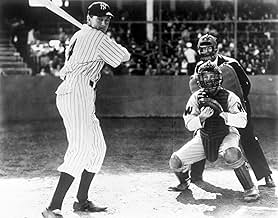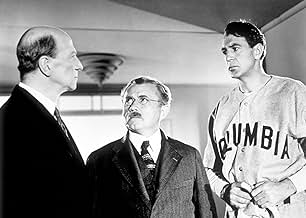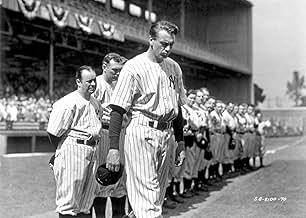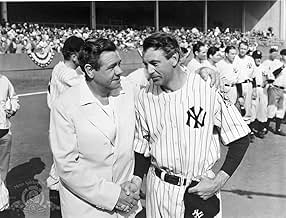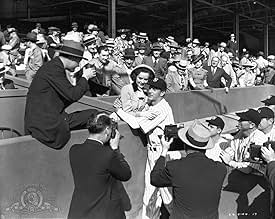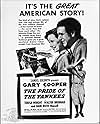IMDb-BEWERTUNG
7,6/10
12.560
IHRE BEWERTUNG
Die Geschichte über das Leben und die Karriere des berühmten Baseballspielers Lou Gehrig.Die Geschichte über das Leben und die Karriere des berühmten Baseballspielers Lou Gehrig.Die Geschichte über das Leben und die Karriere des berühmten Baseballspielers Lou Gehrig.
- 1 Oscar gewonnen
- 5 Gewinne & 10 Nominierungen insgesamt
Ludwig Stössel
- Pop Gehrig
- (as Ludwig Stossel)
Bob Meusel
- Robert W. Meusel
- (as Robert W. Meusel)
Empfohlene Bewertungen
Gary Cooper may have won his Oscar for SERGEANT YORK--but I think he deserved it even more for PRIDE OF THE YANKEES. I've never seen him give a more heartfelt, natural and completely likeable performance than I have here. And Teresa Wright is glowing as his sweetheart.
It tells Lou Gehrig's story in a simple, straightforward manner with only an occasional bit of Hollywood corn, the kind so typical of the 1940s. But the main storyline is carried by Cooper and Wright with some great assist from Walter Brennan. Brennan drops a lot of his cornball mannerisms (the kind he uses he in all his Western roles) and plays it straight here--with excellent results.
But it's Cooper's achievement--no doubt about that. If the last twenty minutes of the film don't move you to tears, you're made of stone. Cooper gets across the panic and fear that hits him with the first signs of his illness--with a subtle show of facial expressions. He's really into his character here and gives one of the best performances of his career.
Knowing someone who died from this disease, I was especially moved at how the first signs of illness were shown here.
Douglas Croft does a fine job as the young Lou--and by the way, whatever happened to him? He played Ronald Reagan as a boy in KINGS ROW and did several other films in the '40s. And how come Dane Clark received no billing in the credits? He was only seen early on in the film but he had a line of dialogue as one of Lou's fraternity pals. He had no credit in Alan Ladd's THE GLASS KEY too--he's the man Brian Donlevy shoves through a plate glass window. A year later he was being given the star buildup at Warner Bros.
A great film and a wonderful tribute to Lou Gehrig.
It tells Lou Gehrig's story in a simple, straightforward manner with only an occasional bit of Hollywood corn, the kind so typical of the 1940s. But the main storyline is carried by Cooper and Wright with some great assist from Walter Brennan. Brennan drops a lot of his cornball mannerisms (the kind he uses he in all his Western roles) and plays it straight here--with excellent results.
But it's Cooper's achievement--no doubt about that. If the last twenty minutes of the film don't move you to tears, you're made of stone. Cooper gets across the panic and fear that hits him with the first signs of his illness--with a subtle show of facial expressions. He's really into his character here and gives one of the best performances of his career.
Knowing someone who died from this disease, I was especially moved at how the first signs of illness were shown here.
Douglas Croft does a fine job as the young Lou--and by the way, whatever happened to him? He played Ronald Reagan as a boy in KINGS ROW and did several other films in the '40s. And how come Dane Clark received no billing in the credits? He was only seen early on in the film but he had a line of dialogue as one of Lou's fraternity pals. He had no credit in Alan Ladd's THE GLASS KEY too--he's the man Brian Donlevy shoves through a plate glass window. A year later he was being given the star buildup at Warner Bros.
A great film and a wonderful tribute to Lou Gehrig.
A touching and emotional experience about the life of late-New York Yankees first baseman Lou Gehrig (played brilliantly by the always excellent Gary Cooper, Oscar-nominated). By 1939 Gehrig was saying farewell to baseball prematurely due to a rare muscle disorder that today bears the hero's name. Shortly after Gehrig's famous speech, he would indeed pass away. "The Pride of the Yankees" (made less than three years after his death) is a moving tribute that is first-class in every way imaginable. We meet the character as a young boy whose strict mother wants him to be an engineer. As the years pass though he cannot deny his love of the grand old game. Sportswriter Walter Brennan (who was always outstanding as well) becomes the biggest supporter of Gehrig, even though Gehrig seems out-of-place in the big city at times and seems more concerned about baseball than anything else (which bothers some inside of the Yankees circle, mainly due to Babe Ruth's famous antics). As the years pass, championships come and a constant is always Gehrig who set a record with 2,130 consecutive games played (Cal Ripken, Jr. would later break that record in 1995). He finds love with a young woman from Chicago (Oscar-nominee Teresa Wright) and it appears that happiness is all that the couple will experience. Sadly that would not be the case though. Sam Wood's heart-felt direction and a focused screenplay (which is a bit sappy at times) just add an odd element of grace that endears the film to most all movie-goers. Babe Ruth does play himself here and is a surprisingly excellent performer who allows himself to be taken out of the spotlight to tell Gehrig's story. He ends up being a really solid supporting actor. I do admit that "The Pride of the Yankees" is slightly flawed. Some things seem a bit staged (most notably the young child in the hospital), but overall the film is right on target. Anyone who loves baseball, loves movies and has feelings (whether good, bad or indifferent) about the Yankees should definitely give "The Pride of the Yankees" an at-bat. It is a stunning experience that is suitable for the whole family and teaches the whole audience about love, friendship, compassion, life, death and heroism. 4.5 out of 5 stars.
After seeing this movie, I went out and bought the Ken Burns documentary on Baseball. It's amazing how nice of a guy Lou Gherig was! He was a true gentleman. He brought his Mom to ALL THE GAMES. He was a true hero as well. I liked this movie and it was very sad to see Lou get stiff toward the end of the movie. Babe Ruth played himself and that was no hard task for him. I bought this movie it was so darn good.
A lot of non-baseball fans still liked this movie a lot, and that's probably because it's more about a nice guy than it is about a ballplayer. New York Yankee great Lou Gehrig is the subject. Gehrig was often in the shadow of the great Babe Ruth, but was tremendous player in his own right and a far better human being.
It's tough to find many nicer movies than this one: a totally inoffensive, sentimental and old- fashioned film about a super-nice guy, played by a popular actor: Gary Cooper. Except for one sportswriter, there were no villains or nasty people in this movie.
Teresa Wright plays "Eleanor Twitchell," who becomes Gehrig's wife and Walter Brennan plays sportswriter and friend, "Sam Blake." The real Babe Ruth played himself, which was nice to see.
Even though Gehrig died at a fairly young age of a disease now named after him, overall this was a feel-good movie of the highest sort. This was so nice a story that even the cynical critics dared not criticize it. It leaves you with tears in your eyes at the end.
It's tough to find many nicer movies than this one: a totally inoffensive, sentimental and old- fashioned film about a super-nice guy, played by a popular actor: Gary Cooper. Except for one sportswriter, there were no villains or nasty people in this movie.
Teresa Wright plays "Eleanor Twitchell," who becomes Gehrig's wife and Walter Brennan plays sportswriter and friend, "Sam Blake." The real Babe Ruth played himself, which was nice to see.
Even though Gehrig died at a fairly young age of a disease now named after him, overall this was a feel-good movie of the highest sort. This was so nice a story that even the cynical critics dared not criticize it. It leaves you with tears in your eyes at the end.
First off, my favorite actor of all time is Gary Cooper. I love his acting style, the gawkiness he often used in his screen roles, in addition of course to the fact that I thought he was absolutely gorgeous, in his prime (when he was in his 30's and 40's). Cooper's appeal is only enhanced, for me, by the distance of his on screen persona from his real-life one...he was quite the ladies' man in real life, not awkward with women as the characters he often portrayed on screen, and his smoldering sexuality shows from his piercing blue eyes. His lively offscreen affairs with stars such as Clara Bow (who famously declared "He's hung like a horse and he can go all night!"), Lupe Velez aka "The Mexican Spitfire", and of course Patricia Neal, are the stuff of old Hollywood legend.
Kevin Costner and Ralph Fiennes in their primes had nothing' on Coop. He was the man. Cooper, who started off wanting to be an artist, fell into acting instead, first as a stunt man in westerns, but quickly getting leading roles. He continued to do most of his own riding and stunts even into his later years, carving himself quite a name as a star of westerns, including the western classic "High Noon" (1952), but my favorite films of his were films such as "Mr. Deeds Goes To Town" (1936), "Meet John Doe" (1941), "Ball Of Fire" (1941), "Sargeant York" (1941), and of course "The Pride Of The Yankees". My husband understands my adoration of Gary Cooper; and/but we had this brief discussion before we watched my recently purchased DVD of the film (I'd seen it before, but didn't own a copy of it):
Husband: "I don't mind watching it with you as long as you don't make those noises you always make when you watch a Gary Cooper movie."
Me: "What noises?"
Husband: "Those noises like the ones Homer Simpson makes when he looks at a stick of butter...'Mmmmmmmm'...."
Me: "What? I didn't know I did that. Okay, I won't make any weird noises while we watch it."
So I was quiet (except for of course choking up in tears when Cooper delivers Gehrig's legendary "Today, I consider myself to be the luckiest man on the face of the earth" farewell speech). Gehrig's retirement speech helped immortalize him as a hero and an all-American role model.
"The Pride of the Yankees" is the blueprint for the sports biopic, and is generally considered to be the best movie about baseball ever made. Teresa Wright stars as his wife Eleanor. Wright, who just passed away this March, was an excellent actress, and a beautiful woman. The last film I saw her in was in a small part in "Somewhere In Time", and she had aged wonderfully. She and Cooper had great chemistry on screen, holding her own ground as he towered over her petite 5'3" frame.
Walter Brennan, a frequent Cooper co-star and real-life friend, and Babe Ruth as himself are two other co-stars who contribute much to the film.
The film traces the rags-to-riches story of Gehrig, as his childhood dream comes true when he's signed to the New York Yankees, and his untimely retirement when he is stricken with the fatal, neurological disease ALS (amyotrophic lateral sclerosis) which was afterwards simply called "Lou Gehrig's Disease". Cooper, although a bit of an odd choice for the part (one reason being his height, he was about 6'4"), gives an endearing, heartfelt, dignified performance, for which he was nominated for an Academy Award. Gehrig was left-handed, Cooper right-handed, which was further complicated by the fact that Cooper himself wasn't a capable baseball player. For the filming, his uniform had "New York" printed backwards on it, he ran to third base when he hit a ball, and then the print was reversed.
Nominated for 11 Academy Awards in all, and receiving 1 (for Film Editing), "The Pride Of The Yankees" still stands as a must-see film for baseball fans and fans of classic cinema alike.
Kevin Costner and Ralph Fiennes in their primes had nothing' on Coop. He was the man. Cooper, who started off wanting to be an artist, fell into acting instead, first as a stunt man in westerns, but quickly getting leading roles. He continued to do most of his own riding and stunts even into his later years, carving himself quite a name as a star of westerns, including the western classic "High Noon" (1952), but my favorite films of his were films such as "Mr. Deeds Goes To Town" (1936), "Meet John Doe" (1941), "Ball Of Fire" (1941), "Sargeant York" (1941), and of course "The Pride Of The Yankees". My husband understands my adoration of Gary Cooper; and/but we had this brief discussion before we watched my recently purchased DVD of the film (I'd seen it before, but didn't own a copy of it):
Husband: "I don't mind watching it with you as long as you don't make those noises you always make when you watch a Gary Cooper movie."
Me: "What noises?"
Husband: "Those noises like the ones Homer Simpson makes when he looks at a stick of butter...'Mmmmmmmm'...."
Me: "What? I didn't know I did that. Okay, I won't make any weird noises while we watch it."
So I was quiet (except for of course choking up in tears when Cooper delivers Gehrig's legendary "Today, I consider myself to be the luckiest man on the face of the earth" farewell speech). Gehrig's retirement speech helped immortalize him as a hero and an all-American role model.
"The Pride of the Yankees" is the blueprint for the sports biopic, and is generally considered to be the best movie about baseball ever made. Teresa Wright stars as his wife Eleanor. Wright, who just passed away this March, was an excellent actress, and a beautiful woman. The last film I saw her in was in a small part in "Somewhere In Time", and she had aged wonderfully. She and Cooper had great chemistry on screen, holding her own ground as he towered over her petite 5'3" frame.
Walter Brennan, a frequent Cooper co-star and real-life friend, and Babe Ruth as himself are two other co-stars who contribute much to the film.
The film traces the rags-to-riches story of Gehrig, as his childhood dream comes true when he's signed to the New York Yankees, and his untimely retirement when he is stricken with the fatal, neurological disease ALS (amyotrophic lateral sclerosis) which was afterwards simply called "Lou Gehrig's Disease". Cooper, although a bit of an odd choice for the part (one reason being his height, he was about 6'4"), gives an endearing, heartfelt, dignified performance, for which he was nominated for an Academy Award. Gehrig was left-handed, Cooper right-handed, which was further complicated by the fact that Cooper himself wasn't a capable baseball player. For the filming, his uniform had "New York" printed backwards on it, he ran to third base when he hit a ball, and then the print was reversed.
Nominated for 11 Academy Awards in all, and receiving 1 (for Film Editing), "The Pride Of The Yankees" still stands as a must-see film for baseball fans and fans of classic cinema alike.
Wusstest du schon
- WissenswertesReleased just 17 months after Lou Gehrig's death.
- PatzerAs Gehrig (Cooper) is doing his homework at Columbia, he writes with his right hand. Whilst Gehrig batted and threw left-handed, like many lefties of the era (perhaps because of "correction" in school), he wrote with his right hand.
- Zitate
[last lines]
Lou Gehrig: [his farewell speech]
Lou Gehrig: Today, I consider myself the luckiest man on the face of the earth... play ball!
- Crazy CreditsOpening credits acknowledgment: Appreciation is expressed for the gracious assistance of Eleanor Gehrig (as Mrs. Lou Gehrig) and for the cooperation of Ed Barrow (as Mr. Ed Barrow) and the New York Yankees arranged by Christy Walsh.
- Alternative VersionenA colorized version is available.
- VerbindungenFeatured in Diamonds on the Silver Screen (1992)
- SoundtracksTake Me Out to the Ball Game
(1908) (uncredited)
Music by Albert von Tilzer
Played during the opening credits and often in the score
Top-Auswahl
Melde dich zum Bewerten an und greife auf die Watchlist für personalisierte Empfehlungen zu.
Details
- Erscheinungsdatum
- Herkunftsland
- Sprache
- Auch bekannt als
- Idolo, amante y héroe
- Drehorte
- Produktionsfirma
- Weitere beteiligte Unternehmen bei IMDbPro anzeigen
- Laufzeit1 Stunde 27 Minuten
- Farbe
- Seitenverhältnis
- 1.37 : 1
Zu dieser Seite beitragen
Bearbeitung vorschlagen oder fehlenden Inhalt hinzufügen



